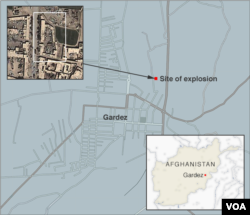Villagers and relatives in eastern Afghanistan Saturday dug a common grave and buried 35 victims of the previous day’s devastating suicide gun-and-bomb attack on a Shiite mosque.
A reporter for VOA’s Afghan language broadcast said hundreds of mourners attended the mass funeral organized under tight security in Gardez, the capital of Paktia province, where Friday’s massacre took place.
Three children were among the dead. The provincial health director, Walayat Khan Ahmadzai, confirmed to VOA on Saturday that the attack injured more than 90 people and the condition of 17 of them is “extremely critical.”
Attackers wearing burqas
Police and witnesses said a pair of burqa-clad suicide bombers, armed with assault rifles, stormed the crowded mosque during afternoon prayers in the Khawaja Hasan area of the provincial capital.
The assailants entered the main prayer hall and sprayed worshippers with bullets before blowing themselves up, the provincial police chief, Raz Mohammad Mandozai, told VOA.
There were no immediate claims of responsibility for the bloodshed in Paktia, which borders Pakistan.
A spokesman for the Taliban insurgency swiftly denied its involvement in the mosque raid, prompting suspicions Islamic State could be behind the Shia carnage.
The Afghan branch of the Middle Eastern terrorist group, known as ISK-P, has claimed responsibility for almost all recent attacks against Shiite worship places and gatherings in Afghanistan.
Attack condemned
President Ashraf Ghani and Chief Executive Abdullah Abdullah have both strongly condemned the terrorist attack on innocent civilian worshipers.
“This attack targeting civilians has no possible justification,” said Tadamichi Yamamoto, head of the United Nations Assistance Mission in Afghanistan, or UNAMA. He called for the perpetrators to be brought to justice and held to account.
“These brutal and senseless attacks against people at prayer are atrocities. Such attacks directed against congregations and places of worship are serious violations of international law that may amount to war crimes,” Yamamoto said.
UNAMA in its civilian casualty report released last month said that civilians continue to bear the brunt of the Afghan armed conflict. In the first six months of 2018, it said, battlefield attacks and militant bombings killed nearly 1,700 Afghan civilians, the highest number of fatalities recorded in a decade.





